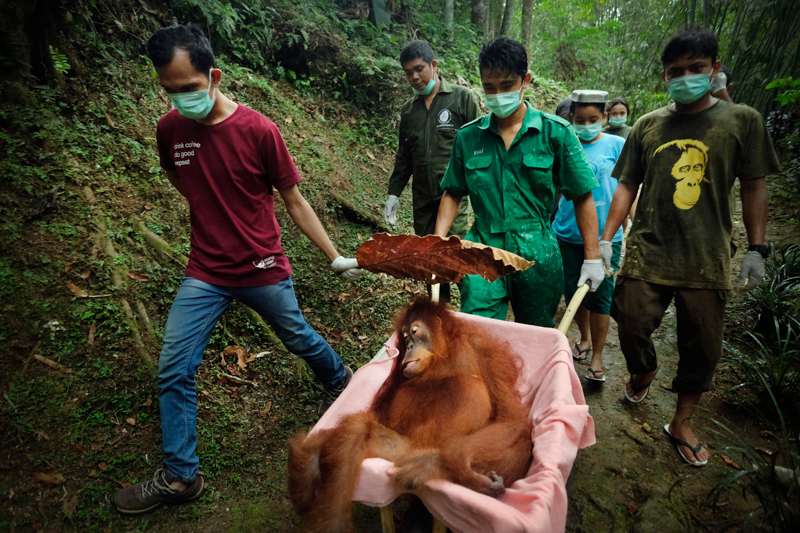Category: Science & Natural History — Singles
First Place
Alain Schroeder / Freelance
“Saving Orangutans”
Second Place
Maciej Dakowicz / Freelance
“Pollution of Yangon River in Yangon, Myanmar”
Third Place
Carl de Souza / Agence France-Presse
“Amazon Burning”
Award of Excellence
Nacho Doce / Reuters
“Brazil Environment/Mangrove Forest”
Award of Excellence
Lotta Härdelin / Dagens Nyheter
“Civil disobedience for the sake of the climate”
Award of Excellence
Sirachai Arunrugstichai / Freelance
“Marium the Mermaid”
Award of Excellence
Aitor Garmendia / Freelance
“Spanish pig industry”
Award of Excellence
Kate Brooks / Freelance
“People of the Forest”

First Place
“Saving Orangutans”
Sibolangit, SOCP Quarantine Centre, North Sumatra, Indonesia.
Sedated and transported by wheelbarrow from her enclosure, Asha is going for a medical check. This 20-year-old female, arrived two years ago (2017) in critical condition with a broken right hand, fractured hip and gangrene of the left hand from being beaten, leaving her thumb nonfunctional. As rain falls, a team member shelters her with a giant leaf.
Indonesia's Sumatran orangutan is under severe threat from the incessant and ongoing depletion and fragmentation of the rainforest. As palm oil and rubber plantations, logging, road construction, mining, hunting and other development continue to proliferate, orangutans are being forced out of their natural rainforest habitat.
Organizations like the OIC (Orangutan Information Centre) and their immediate response team HOCRU (Human Orangutan Conflict Response Unit), rescue orangutans in difficulty (lost, injured, captive...) while the SOCP (Sumatran Orangutan Conservation Programme) cares for, rehabilitates and resocializes orangutans at their purpose-built medical facility, aiming to reintroduce them into the wild and to create new self-sustaining, genetically viable populations in protected forests.
That we share 97% of our DNA with orangutans seems obvious when you observe their human-like behavior. Today, with just over 14,000 specimens left, the Sumatran orangutan (Pongo Abelii) along with the 800 specimens of the recently discovered Tapanuli species (Pongo tapanuliensis), are listed as critically endangered by the International Union for Conservation of Nature (IUCN).



